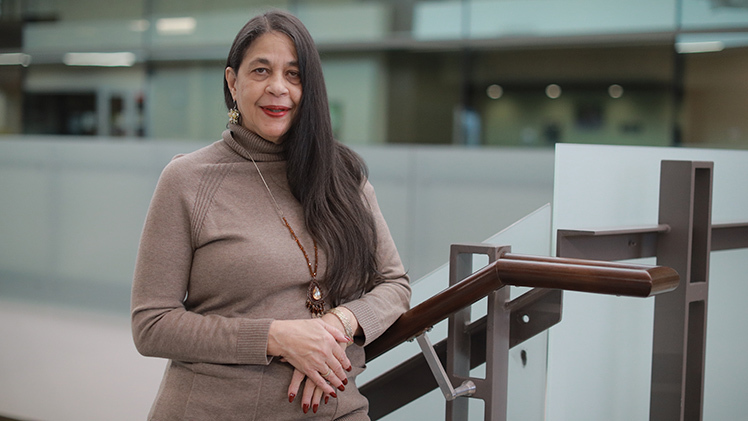Rachelle Sutherland had always considered herself healthy, but routine blood work during an annual exam found something unexpected lurking under the surface — her kidneys were failing.
“I didn’t even know I had a problem,” she said. “I didn’t have heart trouble. I didn’t have diabetes. I wasn’t feeling bad, but my kidney was deteriorating.”

Dr. Kunal Yadav, left, is the surgeon who performed Rachelle Sutherland’s transplant. She was one of a record 174 people who received a kidney transplant last year at UTMC.
On Sept. 17, five years after her initial diagnosis and less than a year after beginning dialysis, Sutherland underwent a successful kidney transplant at The University of Toledo Medical Center.
“Getting this transplant meant getting my life back,” she said. “I am so blessed that UTMC was on the case. They were really fast at trying to get me a kidney and they truly seem like they care about you. I’m so grateful to UTMC and my donor.”
Sutherland, who lives in AuSable Township in northern Michigan, had expected to spend years on dialysis before coming to UTMC.
Those with Type O blood, like Sutherland, typically have the longest wait after being listed for a transplant. While her blood type makes her a universal donor, Sutherland could only receive a transplant from someone else with Type O blood.
Another transplant center had told her it would likely take at least five years to find a suitable match and she had already been on their list for three years without a call.
Sutherland ended up receiving a new kidney just nine months after getting on UTMC’s transplant list.
While Dr. Kunal Yadav, the surgeon who performed Sutherland’s transplant, said that’s unusually fast for her blood type, UTMC’s overall wait times are among the shortest in the nation.
“We have an extremely successful transplant program here at UTMC,” Yadav said. “Our outcomes are as good as much larger, more well-known centers while our wait times are significantly lower.”
The most recent report from the Scientific Registry of Transplant Recipients shows a median wait time to transplant of just over seven months at UTMC, compared to the national average of more than three years.
“Because of our shorter waitlist, we’re not only able to do transplants more quickly, but we also provide a more personal level of care,” Yadav said. “Along with excellent follow-up care by our nephrologists, our patients see their surgeon for a year of follow-up visits. Not a lot of centers do that.”

Following her successful transplant, Sutherland has been able to resume vacation travels that she put on hold because of her failed kidney and dialysis.
Despite the challenges of the ongoing COVID-19 pandemic, UTMC completed a record 174 kidney transplants last year, up from 112 transplants in 2020 and 98 in 2019.
In addition to the benefits of a shorter waitlist, Yadav said UTMC has been able to successfully grow its transplant program by speeding up its evaluation process, widening its criteria for eligible recipients and employing virtual antibody crossmatching — a process that can cut hours off the time physical lab tests take to determine whether a donor kidney is compatible with a specific recipient.
Virtual crossmatching helps UTMC place more donor kidneys and allows surgeons to reduce the time a donor kidney spends outside the body, improving outcomes.
From July 1, 2018, through Dec. 31, 2020 — the period covered by the January SRTR report — UTMC had a one-year graft survival rate of 95.03%, on par with the national average, and a one-year patient survival rate of 99.02%, better than the national average.
Though Sutherland was diagnosed with high blood pressure in her 30s, it was well-controlled and she was otherwise healthy and active at the time of her transplant.
With her new kidney, she’s able to resume vacation travels that had been put on hold.
“Dialysis is extremely time-consuming, boring and I had to schedule my life around those treatments. I felt like my failed kidney and dialysis had me as a prisoner,” Sutherland said. “Being able to take a trip again was just wonderful. I’m doing great. I’m back to normal. I’ve got my life back.”